 |
 |
 |
 |
 |
 |
 |
 |
 |
FA Cup fourth round - Gander Green Lane - 14,000
Scorers: Clarke 4, Lorimer 2
Sutton United: Roffey, Brookes, Clarke, Powell, Faulkner, Gradi, Mellows, Bladon, Drabwell, Pritchard, Howard
Leeds United: Harvey, Reaney, Cooper, Bremner, Charlton, Hunter, Lorimer, Clarke, Jones, Giles, Madeley
At the time, Leeds were reigning league champions and leading the First
Division table, through to the last eight in the European Cup and hotly
fancied to win the FA Cup; they were popularly acknowledged as the most
professional and hard to beat team in the country, maybe even in the whole
of Europe. In contrast, Sutton United were a bunch of amateurs operating
in the Isthmian League, or as Albert Barham put it in The Guardian,
'a collection which includes a schoolmaster, jig borer, cable jointer,
engineers and a panel beater'. Describing the game as 'the day of a lifetime' in his preview, Barham
wrote: 'Halfway between Cheam, of Hancock's Half Hour memory, and
the suburbia of Sutton, a strip board sign leans back from the road. "Sutton
United", it states, yellow and permanent, "versus Leeds United"
in temporary black and white. An arrow points down Gander Green Lane.
What more improbable place for the league leaders, league champions and
favourites to win both the FA and European Cups, to play on Saturday? 'Here, instead of the customary Isthmian League match, Sutton meet Leeds
in the fourth round of the FA Cup, the first amateur club to have got
so far in 17 years. It is to this ground on Saturday that Terry Howard
will hurry after his dawn to midday stint at Billingsgate market - 'I
hope I can get in cos there's one entrance in that's likely to be blocked
- and I hope nobody asks me for a ticket cost I haven't got one either.'
Terry Howard has a delightful broad Cockney humour. He is also the most
experienced Sutton player and looks not unlike Francis Lee. '"I've been to four Amateur Cup finals, the Olympic Games. I've played
in quite a few internationals. But this will be the climax to my career
playing against a First Division side for the first time and one like
Leeds," he said. Quite a number of professionals had strong feelings
about playing amateurs, surely? "I'd feel the same way. Football's
their bread and butter - and I don't envy them their job." 'How does he feel playing against Paul Reaney? "Paul's a Londoner
too so he'll know what I say when I go past him! But seriously he's the
best right-back in the land. I've gained a little bit of heart over the
years. I hope I give him a good game." And Bremner? "I've got
height advantage over him - I'm an inch taller - so he'll have to look
up to me. I don't mean that seriously either. We've done extremely well
- played all our matches away from home - and won well to get where we
are. But to upset the tremendous professionalism of this side we'll have
to play as we've never played before - get an early goal, we hope, and
play our hearts out for 90 minutes. This sort of game has never happened
to the boys before. We've a long way to go even to get a draw out of this.
They're the best team in the land."' Sutton had been around for longer than Leeds, being formed in 1898, and
had joined the Athenian League in 1921, going on to win the championship
on three occasions. In July 1962, the club appointed Norwich City coach
and former Southampton boss Sid Cann as manager. Cann had appeared in
an FA Cup final with Manchester City in 1933, and his appointment sparked
a period of great success for the club. They earned a trip to Wembley Stadium in 1963, losing in the Amateur
Cup final to Wimbledon, and a few months later were elected into the higher
status Isthmian League, which they won in 1967. They lost another Amateur
Cup final in 1969, and were battling stoutly for the Isthmian League title
with eventual champions Enfield in 1970. However, their achievement in
reaching the FA Cup fourth round after beating Hillingdon Borough 4-1
in a third round replay was rightly recognised as the icing on the cake. Sutton secretary Dave Hermitage, who had played for the team that lost
the 1963 Amateur Cup final, spoke in glowing terms of Sid Cann, saying,
'We gave him a seven-year contract, the longest contract ever awarded
a manager by an amateur club. He came to us in the 62 season and took
Sutton to the Cup final. People had not seen that happen before in Sutton.
Then it was the semi final and final again, and we won the Isthmian League
championship. We tried to show our faith in him - he's such an excellent
coach - and to give him some sort of security.' Cann himself looked forward eagerly to the battle with Leeds, saying,
'We are not worried; why should we be? No one expects us to beat them,
and who can seriously expect us to? Except us, maybe. Leeds are the ones
who have to do the worrying. They've got everything to lose - we've got
everything to gain. We've got six amateur internationals in our team,
I think we can put on a good show.' In the week of the game, four Sutton players, Powell, Bladon, Pritchard
and Mellows, were called up for the England amateur squad's game with
Iceland at the beginning of February. But the Sutton player who made the
biggest name for himself in the game was defender Dario Gradi, at that
time FA southern area coach. He became assistant coach at Chelsea a year
later and went on to spend 24 years as manager of Crewe Alexandra. As the club drawn first out of the hat, Sutton had the option of switching
the tie to a larger ground elsewhere to give the chance of earning higher
receipts. In the end they passed up on the opportunity, instead choosing
to play the game at their tiny Borough Sports Ground in Gander Green Lane.
They borrowed some temporary benching from the nearby Oval cricket ground,
boosting the ground's capacity from the normal 8,000 to 14,000. Dave Hermitage on the decision to play at their normal ground: 'The players
wanted that badly and it is an encouragement to our supporters. We worked
on the theory that we would get £3,000 from Elland Road if we switched
the tie - and there would be expenses to pay. Now, this should put our
gates up for the rest of the season and already we've had applications
from people who want to become vice-presidents, and others to join the
supporters' club. They're not after tickets, either, they went ages ago
... We could have sold another 15,000 tickets. This tie will bring us
£3,000. It will put us in the black for a few seasons. We are never much
in debt but a little goes each season. Our £2,000 deficit was written
off by the money we got from the Hillingdon games and now there will be
a nice balance. It's a wonderful achievement for Andrew Letts, the chairman,
too. He's put a lot of money into the club and he always said his ambition
was to see the ground full. Well, he's got it now, though I never thought
we would.' Don Revie was decidedly apprehensive
about the tie, making all sorts of complaints about the arrangements,
and particularly the threat that excited supporters might gatecrash the
ground and force their way onto the pitch: 'Our team is insured for a
million pounds, and it is up to me to do all I can to see they're safe.
The security arrangements must be watertight. Sutton have been working
all week to improve their ground capacity, and they've also been erecting
strong barriers on the low walls which separate the pitch from a recreation
ground, but as I understand them I don't like the arrangements Dave Hermitage countered: 'I think it's a bit of gamesmanship. I spoke
to the local police after Mr Revie telephoned them, they came round, and
we measured the distance between the touchline and the nearest seat at
12 yards. Maybe one in 20 First Division grounds can match that. We could
put a fence up in front of the seats, but Mr Revie would presumably then
go back to his original argument about the danger of injury to players
running off the pitch. I can assure Leeds that no Sutton supporters will
run on to the pitch.' Leeds went into the game without first choice goalkeeper Gary Sprake,
who had returned to his home town, Swansea, after the death of his mother
in the week leading up to the game. Don Revie: 'Especially now that Gary
will not be playing, we couldn't be treating Sutton any more seriously
than if we were playing at Goodison or Anfield. 'I watched Sutton beat Hillingdon, and I came away impressed. Maurice
Lindley and Syd Owen have also seen them. That's three times we've taken
a look, which is more than we saw Ujpest Dozsa before meeting them last
year in the Fairs Cup. I've tried to instil into my players that all opposition,
no matter how easy they may think it's going to be, have to, must be,
treated with the respect any opponents deserve. 'Look what almost happened in the third round. I'd told the team all
week that Swansea were not going to be easy meat. We were to respect their
claims to a place in the fourth round. They Revie had said after seeing Sutton's victory over Hillingdon, 'I never
dreamt Sutton could play so well.' In a typical example of his obsession with thorough preparation, Revie
arranged a special practice match in the days before the Cup-tie. He arranged
usage of the Skelton Road ground of the East End Park Working Men's Club
in Leeds to gain experience on a ground similar to Sutton's. 'One of the
main things I wanted the players to get used to was the sky line at this
sort of ground,' said manager Revie. 'The amount of sky behind the goals,
and the small stands makes a very different picture compared with what
they see on First Division grounds. Skelton Road gives them a good idea
of what they will see on Saturday, and what points arising about passing
and shooting they should note. I am very grateful for being allowed to
use it.' The capacity crowd were all packed into the tiny ground two hours before
the game, which took place on a springlike Saturday afternoon. The pitch,
one of the best in amateur football, looked in good condition, apart from
a soggy patch in the centre circle which had been heavily sanded. Billy Bremner won the toss and opted to kick off. United went straight
onto the attack with Terry Cooper overlapping down the left and goalkeeper
Dave Roffey had to catch a cross from Norman Hunter to prevent Bremner
getting on the end of it. Sutton had some decent attacks afterwards without really threatening
to score, though Hunter had to foul centre-forward Pete Drabwell to break
up one early move and David Harvey had to save a swerving drive from Larry
Pritchard. The amateurs were proving their gameness, but predictably it
was Leeds who opened the scoring after 14 minutes. Hunter was involved in a chase for the ball down the left with a Sutton
defender and beat him to it near the byline, lobbing a cross towards goal.
The Sutton keeper went to catch it at the near post but could only palm
the cross up and on towards the back upright. Allan Clarke was rushing
in at the centre and his uncanny ability to see the opportunity before
it arose left him the easy job of stooping forward to nod it over the
line despite the attentions of a wildly swinging defender. It was a poor
goal from Sutton's perspective but a clear example of Clarke's predatory
instincts. The score took a little of the wind out of Sutton's sails and Leeds began
to dominate proceedings, driving the home side back onto defence. There was panic in the Sutton rearguard with deflections off two defenders
before the ball went behind for a United corner. Then Roffey had to save
smartly from a Mick Jones header after a free kick by Johnny Giles. Jack Charlton had to go off for
treatment after jarring an ankle in a tackle and then sustaining a head
injury in an aerial clash. When he returned Sutton were showing themselves to be no defensive mugs with centre-half
John Faulkner coping admirably with the threat of Clarke and Jones, but
Leeds struck twice in quick succession just before the break to put themselves
in absolute control. In the 41st minute Peter Lorimer got the ball tight on the left touchline
about 25 yards from goal. He shaped to head down the line before cutting
infield to shoot from about five yards outside the area. His low shot
was not one of his fiercest and it went bobbling straight at Roffey, but
the keeper let it slip through his hands and between his legs. He turned
in anguish to try to recover but could only watch the ball go rolling
slowly on over the line to put Leeds 2-0 ahead. Three minutes later Lorimer went outside his man down the right to hit
the touchline before firing across a low centre. Clarke was on the edge
of the goal area and calmly flicked it up into the roof of the net with
the most nonchalant of finishes. The 3-0 score at the break was somewhat hard luck on Sutton, though probably
no more than Leeds deserved. Clarke had the ball in the net again shortly after the resumption but
his effort was chalked off for an offside decision. Sutton responded instantly with Pritchard striking the bar in the 53rd
minute with a great shot, but Leeds swiftly silenced the crowd, who had
been rallied by the effort. Within three minutes Lorimer looped over a
centre from the right flank to the back post. Clarke rose behind his man
to head the ball against the upright. He was not to be denied, however,
and, reacting more quickly than anyone, he slammed home the rebound to
complete his hat trick. It was soon 5-0. Hunter made his way down to the far right
corner and pulled the ball back across goal. First Clarke and then Jones
dummied to take it but let it run on to Lorimer coming in around the penalty
spot. He flicked the ball up with his left foot as if preparing to volley
powerfully, fooling the diving Roffey and two Sutton defenders, before
calmly toe poking it through all three and into the net. It was a masterly
finish. In the 65th minute Drabwell and Faulkner challenged Harvey and the centre-half
got the ball in the net. The home crowd rose as one in joyful celebration
but were soon groaning their disappointment as Hereford referee Jim Finney
disallowed the effort for a clear foul on the keeper. Back came United and Bremner's shot With 13 minutes remaining Leeds went away on another swift raid. Lorimer
pushed the ball down the middle between two Sutton defenders for Clarke
to collect. He left the defenders in his wake as he raced on through the
centre and on into the penalty area before firing it accurately into the
net to make it 6-0 with his fourth goal of the game. Five minutes from time Drabwell miskicked with the goal at his mercy
and really should have given the home side a measure of consolation. It
would have been no more than they deserved for the spirited way the amateurs
had competed with their classy visitors. Leeds had never really been stretched, but their gallant hosts had performed
admirably and United lined up in a guard of honour to applaud them off
at the end. Sutton defender John Faulkner, 22, had given an impressive performance
and United manager Don Revie had seen enough to earmark him as a possible
successor for 34-year-old Jack Charlton. Revie won the chase for Faulkner's
signature a few weeks later in the face of competition from Arsenal and
Spurs. Unfortunately, Faulkner's spell at Elland Road was disastrous;
before the end of the season he had conceded an own goal and broken his
knee cap in the two games he played for the club.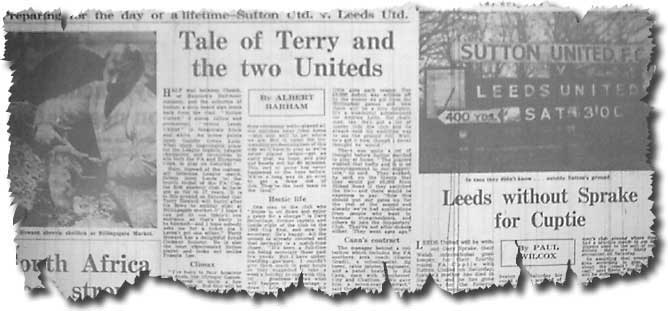 The
FA Cup has always been loved by football romantics, chiefly for the unique
opportunity afforded for the most mundane of football teams to be pitched
into the national spotlight after being drawn against one of the giants
of the English game; rarely has there been a starker contrast between
Davids and Goliaths than in January 1970, when Leeds United were drawn
to meet tiny Sutton United.
The
FA Cup has always been loved by football romantics, chiefly for the unique
opportunity afforded for the most mundane of football teams to be pitched
into the national spotlight after being drawn against one of the giants
of the English game; rarely has there been a starker contrast between
Davids and Goliaths than in January 1970, when Leeds United were drawn
to meet tiny Sutton United.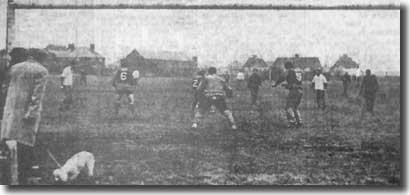 because
the seats give instant access to the pitch and so to the players. It wants
only one mug with a bottle or a brick and a player worth a quarter of
a million is out injured, possibly at the worst for life. I don't like
the set up, and I told the police I didn't. They have arranged to meet
me when our team calls at the ground on Friday afternoon on the way to
the hotel.'
because
the seats give instant access to the pitch and so to the players. It wants
only one mug with a bottle or a brick and a player worth a quarter of
a million is out injured, possibly at the worst for life. I don't like
the set up, and I told the police I didn't. They have arranged to meet
me when our team calls at the ground on Friday afternoon on the way to
the hotel.'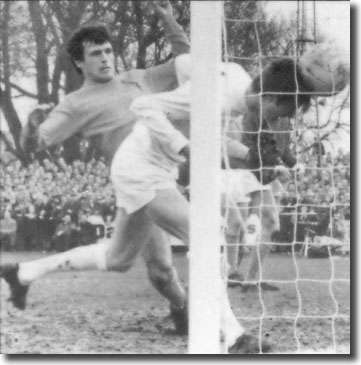 have a number of more than
useful players. Then we went out like a team which had been thrown together.
Eight of the side seemed determined to show off their skills, and consequently
played like strangers. We could have lost, and that's not going to happen
again. I don't think we've got a lot to worry about, but neither are we
complacent.'
have a number of more than
useful players. Then we went out like a team which had been thrown together.
Eight of the side seemed determined to show off their skills, and consequently
played like strangers. We could have lost, and that's not going to happen
again. I don't think we've got a lot to worry about, but neither are we
complacent.'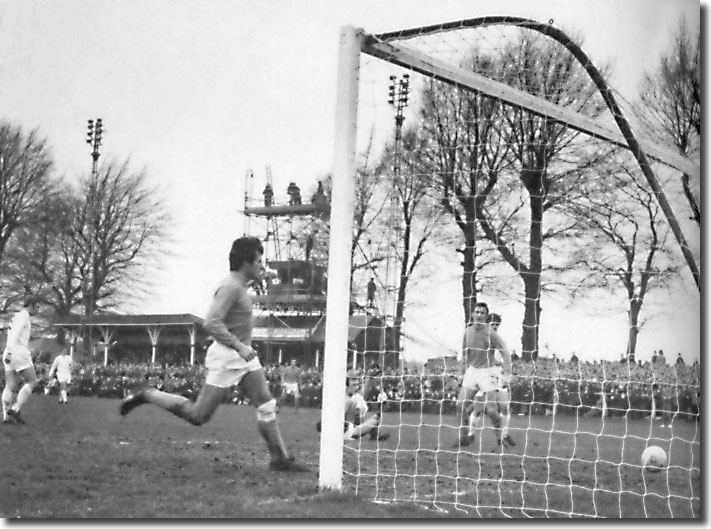 five minutes later he was
sporting a plaster on his forehead.
five minutes later he was
sporting a plaster on his forehead.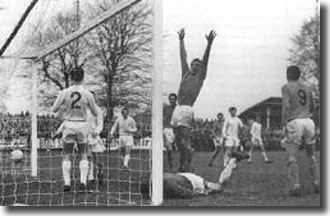 flicked over off the bar before Roffey
saved a Giles shot.
flicked over off the bar before Roffey
saved a Giles shot.